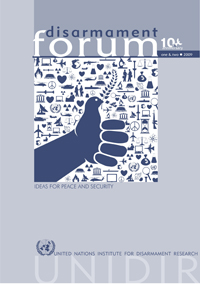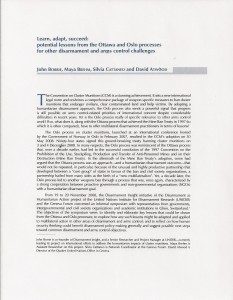
SANCTIMONEOUS HERESY: Right-wing Israelis demonstrate in Jabal Mukabber after hundreds ransacked the village in occupied East Jerusalem, destroying Palestinian property, March 2008. (Meged Gozani/Activestills)
A third uprising?

SANCTIMONEOUS HERESY: Right-wing Israelis demonstrate in Jabal Mukabber after hundreds ransacked the village in occupied East Jerusalem, destroying Palestinian property, March 2008. (Meged Gozani/Activestills)
A third uprising?

The United Nations Institute for Disarmament Research (UNIDIR) and its formal but free online publication, Diarmament Forum, the cover is shown to the left here, linking to the Forum's home page, is the model for the Journal of Public Intelligence.
Today we are creating a new section for the Journal, “Worth a Look,” which will point to relevant scholar-practitioner publications that make a contribution to the emerging and converging disciplines of Collective Intelligence, Public Intelligence, Cognitive Science, and Global from Local Public Administration, the latter the ultimate constituency for the Journal of Public Intelligence.
Below is the first page and link to the seven-page UNIDIR article, “Learn, adapt, succeed: potential lessons from the Ottawa and Oslo processes for other disarmament and arms control challenges.”
We note with special interest the importance of informal trust networks that are by, with, of, and BEYOND all bureaucratic entities.

Protection Rackets
By Christopher Dickey | Newsweek Web Exclusive
Jul 31, 2009
In Afghanistan, Americans should deploy Pvt. Social Worker and Maj. Sociologist.
PBI: The conclusion first:
“You have to learn to discriminate if you're going to win,” said Villalobos. “And in Afghanistan, that's the problem. You don't know how to do that. You don't speak the languages; you don't understand the cultures. And then you have two other problems. First, you are the invader, the outsider.” And that's not going to change. “And second, you add to this the problem with your own record of human-rights violations.” Villalobos mentioned the Iraq horror picture show at Abu Ghraib in 2004 and the long history of abuses at the Bagram military base.To achieve anything in that sort of environment, soldiers have to be willing and able to move around among the public. But the “force protection” that is at the heart of so many U.S. military tactics and procedures makes that awkward if not impossible. You can't convince the people you can protect them from the insurgents, after all, if you look like you're not sure you can protect yourself. They just ask why you're there in the first place. And that question is increasingly hard to answer.
PBI: Now the middle meat:
“Afghanistan,” said Villalbos, “is super complicado.”
“In the old days, your problem was to defeat the enemy, and it didn't matter which way you did it,” the veteran guerrilla told me. “We had rural societies that were cut off from each other; you could eliminate your enemies without people seeing, and you could create a long peace that way. But in a world that is more interconnected, the idea of human rights has become more universal, and there has developed a direct relationship between human rights and military effectiveness.” Is McChrystal reading Villalobos? They seem to be very much on the same page.
As Villalobos sees it, the power to intimidate is much more limited than it used to be, and the risk of too much intimidation is that you will scare civilians right into the arms of your enemies. (Indeed, this was one of Al Qaeda's big mistakes in Iraq.) “Too much discussion about human rights has been about ethics,” said Villalobos, “and it's not only an ethical problem, it's an operational problem. The army of the future needs officers that are sociologists and soldiers that are social workers.
PBI: Read the beginning and other bits by clicking the Newsweek logo.
+++++++Marcus Aurelius Comment+++++++
Quite possibly, much of the force protection problem can be traced to a terrorist attack on a US bus Honduras in the late 1980s. That influenced future Southern Command (Latin America) commander GEN George Joulwan who later was European command commander during the Balkans interventions. GEN Joulwan's very robust view of force protection arguably set the tone for much of what our forces are doing today in the CENTCOM AOR.
+++++++Phi Beta Iota Editorial Comment+++++++
“Force Protection” is code for “Friendly Casualty Aversion” as well as the US Army's old mind-set of not allowing commanders any latitude in the way of mistakes–zero tolerance paved the way for micro-management and micro-reporting, and that is how the US Army trains, equips, and organizes. It became effective at killing indiscriminately and very ineffective at winning and holding ground and the hearts and minds on that ground. The Battle of Jutland and the “Rules of the Game” lessons learned and not learned by the British Empire apply equally to the American Empire. What this boils down to is that the Americans have substituted technology for thinking and doctrine for strategy. There is no good strategic reason for being in Afghanistan, nor is there a good strategic reason for continuing to spend $1 trillion a year on a 1950's force structure model, and now toward $90 billion a year on a secret intelligence community optimized to cover Soviet communications and little else. At the same time, between partisan ideology, Wall Street special interests, and bureaucratic corporatism, US foreign policy can safely be said to be–we quote Madeline Albright–the equivalent of “gerbils on a wheel.” See the other book below by Morton Halperin, a book that includes as one of the “rules of the game,” “Lie to the President if you can get away with it.” With a lack of integrity so prevasive, America is her own worst enemy.



Franklin “Chuck” Spinney is living the dream sailing in the Mediterranean with his forever spouse and a dog that is all bark and no bite. He remains the “last man standing” from the whistle-blowing era of the 1980's when giants like Colonel John Boyd tried to force the Pentagon to get a grip on reality. As we like to point out, we lost over 1,000 tanks by D-Day +2, today the Air Force is happy with 200 really expensive, really complicated fighters that do not perform as advertised and are not relevant to 90% of our needs.
Today Chuck, whom we are proud to call a friend and mentor, takes on the core issue of translators, the DoD translator hiring program, and the question of whether the chain of command from the force commanders in the field through the US Central Command into the Pentagon, and over to the National Security Council had any idea at all: a) that competent real-time field translation is the center of gravity; and b) that we suck at it.
Below are a couple of paragraphs, followed by the CounterPunch logo link to the full Spinney unleashed story, and a Frog Right link to the Phi Beta Iota highlighting of the Associated Press story that set Chuck off.
One last comment: Winston Churchill understood America, the land that gave the world his mother. He liked to say “Americans always do the right thing–they just try everything else first.” So it has been with talking to imams and tribal leaders in Iraq, so it is now with translators. Many of us have been saying for two decades now that we need to get a grip on the 183 languages we do not speak, and contractors hired under criminally negligent conditions simply will not do. Phi Beta Iota can solve this problem in 90 days. We are not holding our breath waiting for a call from the Pentagon.
+++++++Begin Spinney Unleashed+++++++
. . . . . . .
The requirement for alien outsiders to blend in with xenophobic insiders embodies another requirement: to succeed, blending at the tactical level must be expanded gradually and seamlessly to the strategic level of the conflict. But for this kind of bottom-up evolution to take place, at least two other conditions must be satisfied: First, troops at the lowest level of tactical organization must have the linguistic capabilities needed to communicate effectively with the locals in their own language and dialect. Second, the troops must be given enough time to evolve success from the bottom up, that is, by insensibly synthesizing the empathy skills needed to expand their blending operation from the clan/village level to the tribal/provincial level to the national level. If nothing else, Obama's reincarnated ink spot strategy is based on the belated recognition that Bush's seven-year strategy of trying to procure success brutishly from the top down in Afghanistan has not worked — a point made painfully clear by the rejuvenation of the Taliban in the presence of American strategy to prop up the corrupt and inept administration of its protege Hamid Karzai.
Naturally, given the central importance of (1) linguistic skills and (2) time to the success of the “new” counterinsurgency strategy, one would have thought that the Generals who sold President Obama on the new strategy appreciated both fundamental requirements and made robust provisions for providing the minimum essential building blocks to the front-line troopers tasked by the Pentagon to “shape cultural terrain” at the pointy end of the spear.
. . . . . . .
So, how is the first and most basic necessary condition, namely the provision of linguistic capabilities, playing out in field and back home in Versailles on the Potomac?
A shocking AP Report by Jason Sraziuso describes a horrifying situation in the field. While recruiting statistics suggest, at least to the mindless bean counters in Versailles, that linguistics capabilities are building up rapidly, the information in Sraziuso's report reveals this to be a sham. Sraziuso describes how the Pentagon's brass hats have created and reinforced a translator crisis by relying on unscrupulous contractors to provide the crucially needed linguistics capabilities. In effect, the brass hats have made a mockery of their own strategy by short shrifting its most basic building block. Moreover, by privatizing the translator requirement, they are making an oxymoronic policy decision that effectively says the centrally important assumption of the new blending strategy — basic linguistic skills — is not important enough to be provided for in-house.
But there is more. Sraziuso goes on to show how the oxymoron is playing out in the real world of Pentagon contracting: The contractors have used false pretenses to recruit large numbers of unqualified translators. Recruiters tell prospective translators that they will not be placed in harms way, yet the the strategy requires the translators to be on the pointy end of the spear at the squad level. Recruiters are accepting translators who are physically unqualified; some are in their 60s and 70s, have not been required to pass physical fitness exams, have heart conditions, or are not acclimated to the effects of searing heat and high altitude. Yet upon arrival in Afghanistan, these recruits discover they are expected to hump it with the grunts. Not surprisingly, many quit. Incredibly, Sraziuso cites instances where recruiters have recruited translators with the wrong language skill — e.g., recruiting Dari-only speakers to translate Pashto. An, oh by the way, the whole process is greased Pentagon-style with gobs of money: Class II translators are bribed to join in this sham with base salaries of over $210,000 per year. No doubt, these a little research would find that these exorbitant salaries inflate profits, because they are added to the companies' cost bases, which are used in the cost-reimbursement clauses of cost-plus contracts. Despite such bloated salaries, many translators quite sensibly call in sick or quit, once they realize what they have gotten into. Not surprisingly, soldiers also told Sraziuso they are being endangered by this incompetent give way, because when the translators can not talk to locals, they can not provide the local intelligence needed by the soldiers to avoid ambushes and boob traps. The greater strategic requirement to blend into and build empathy with the local cultures is not addressed by Sraziuso, but the implication is clear.



By Brian Krebs
July 29, 2009; 3:15 PM ET
The Washington Post
Imagine simply visiting a Web forum and finding that doing so forced your browser to post an embarrassing Twitter message to all of your contacts, or caused you to admit a stranger to your online social network. Now consider the same dynamic being used to move money out of your online auction account or delete the contents of your e-mail inbox.
. . . . . . .
The problem with the token-based security approach, as researchers prior to Hamiel and Moyer have noted, is that it works only if the attacker doesn't have access to that random string of data as well.
To take the Alice and Bob on the forum example a step further, consider what happens when Alice views a forum posting by Bob that includes a link to an off-site image hosted at a site controlled by Bob. That image, when loaded by Alice's browser, will automatically send Bob's site a referrer URL that includes the full token that is unique to Alice's browser session with that forum. Armed with the referring URL's token, Bob can then respond to the image request from Alice's browser with a request to silently take action on that forum in Alice's name.
. . . . . . .
Moyer said one way to prevent this attack is commonly used on banking Web sites involves what's known as a nonce, which is essentially a random, one-time-use-only number that is appended to a URL each time a visitor loads a page on that site. He noted that one reason most sites don't adopt this approach is that it requires far more computational and Web server capacity, which can drive up costs — particularly for high-traffic sites.

+++++++Phi Beta Iota Editorial Comment+++++++
In 1990-1991 Winn Schwartau testified to Congress. They ignored him the way they ignored Peak Oil testimony in 1974-1975. In 1995 Robert Steele organized three top experts, Schwartau, Jim A from NSA, and Bill Caelii, and submitted a cross-walk of crystal clear recommendations adding up to $1 billion a year to Marty Harris, responsible for the security of the National Information Infrastructure (NII). Today the US Government is about to waste $12 billion a year helping NSA further its own agenda while ignoring the root needs of the American people for trusted electromagnetic services. The federal government is so busy attacking other people it is neglecting the people that created the federal government as a service of common concern. The gap between those exercising public power and those who elected them and pay them has grown cataclysmic. Public intelligence in the public interest is one way to help the Republic heal.

From a retired Marine colonel continuing to serve in the CENTCOM AOR….
‘I believe that banking institutions are more dangerous to our liberties than standing armies. If the American people ever allow private banks to control the issue of their currency, first by inflation, then by deflation, the banks and corporations that will grow up around the banks will deprive the people of all property – until their children wake-up homeless on the continent their fathers conquered.'
It is incumbent on every generation to pay its own debts as it goes. A principle which if acted on would save one-half the wars of the world.
When we get piled upon one another in large cities, as in Europe, we shall become as corrupt as Europe
.
Thomas Jefferson
The democracy will cease to exist when you take away from those who are willing to work and give to those who would not.
Thomas Jefferson
I predict future happiness for Americans if they can prevent the government from wasting the labors of the people under the pretense of taking care of them.
Thomas Jefferson
My reading of history convinces me that most bad government results from too much
government.
Thomas Jefferson
No free man shall ever be debarred the use of arms.
The strongest reason for the people to retain the right to keep and bear arms is, as a last resort, to protect themselves against tyranny in government.
Thomas Jefferson
The tree of liberty must be refreshed from time to time with the blood of patriots and tyrants.
To compel a man to subsidize with his taxes the propagation of ideas which he
disbelieves and abhors is sinful and tyrannical.
Thomas Jefferson
“Those who turnt heir guns into plowshares will plow for those who don't.”
After spending a week traveling the frontline of the “war on terrorism” — from the aircraft carrier U.S.S. Ronald Reagan in the seas off Iran, to northern Iraq, to Afghanistan and into northwest Pakistan — I can comfortably report the following: The bad guys are losing.
Yes, the dominos you see falling in the Muslim world today are the extremist Islamist groups and governments. They have failed to persuade people by either their arguments or their performances in power that their puritanical versions of Islam are the answer. Having lost the argument, though, the radicals still hang on thanks to gun barrels and oil barrels — and they can for a while.
. . . . . . .
To the extent that the radical Islamists have any energy today, it comes not from the power of their ideas or examples of good governance, but by stoking sectarian feuds. In Afghanistan, the Taliban play on Pashtun nationalist grievances, and in Iraq, the Sunni jihadists draw energy from killing Shiites.
The only way to really dry up their support, though, is for the Arab and Muslim modernists to actually implement better ideas by producing less corrupt and more consensual governance, with better schools, more economic opportunities and a vision of Islam that is perceived as authentic yet embracing of modernity. That is where “our” allies in Egypt, Palestine, Iraq, Afghanistan and Pakistan have so consistently failed. Until that happens, the Islamist radicals will be bankrupt, but not out of business.
+++++++Phi Beta Iota Editorial Comment+++++++
Most readers will focus on the beginning of Friedman's story and completely miss the ending. What Friedman does not state that needs stating over and over again is that the U.S. taxpayer is being cheated by a foreign policy that substitutes technology for thinking, military sales for strategy, and convenient dictators for democracy. Until we have an Undersecretary of State for Democracy with one Assistant Secretary for those dictators that agree to a five-year exit strategy, another for those that do not; and a counterpart Undersecretary of Defense for Peace who can move beyond the lip service that Defense continues to give to Operations Other Than War (OOTW), Stabilization & Reconstructions (S&R), Humanitarian Assistance (HA), and the mother of all military strategies, Irregular Warfare properly defined as Waging Peace by All Means Possible, we will continue to betray the public interest at home as well as abroad.
Click on NYT Logo Above for the Full Story Online.